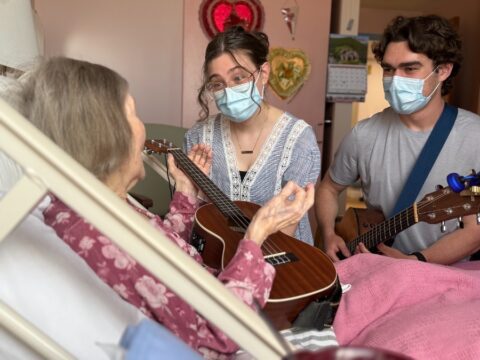This story was originally published by Religion Unplugged.
Karen Walsh Gillingham might have felt lonely when she moved to a new home in Mendham, New Jersey. She was single then, with one son soon headed for college and another already there.
But she also had Baxter, a mini golden doodle who loved feeling the breeze out the car window during their rides in the countryside. “It was me and Baxter,” she recalled.
Baxter was by her side for 12 years, through the joy of her remarriage, the births of grandchildren and the pandemic. She was shocked when he was diagnosed with terminal cancer and died in October 2022. A retired nurse, Gillingham had faced many other losses, including the deaths of her best friend and both parents. But losing Baxter still hit hard.
After she wrote about her pain on Instagram, a friend suggested Gillingham talk with an animal chaplain. Gillingham scheduled a virtual conversation with the Rev. Sarah Bowen, an animal chaplain and ordained minister in New York through One Spirit Interfaith Seminary. Bowen is the author of “Sacred Sendoff: An Animal Chaplain’s Advice For Surviving Animal Loss, Making Life Meaningful, & Healing The Planet.”
“It was so comforting to hear somebody who has experience say, ‘It’s OK; it’s normal, and all that grief is just love that has nowhere to go,’” Gillingham said.
Chaplains provide spiritual support in hospitals, hospices, universities, the military and other settings outside of congregations. Animal chaplains focus on relationships or concerns involving animals, from a family struggling with a pet’s illness to a veterinary tech overwhelmed with seeing animals die at work to an activist struggling over the loss of a species or habitat. “Animal chaplaincy for me means that I support all beings regardless of their belief system or species,” Bowen said.
Animal chaplains can help clients prepare for a pet’s passing and run animal loss support groups. They partner with clients to develop rituals, from memorial events to a welcome for a new animal companion. They may also lead “blessing of the animals” services at houses of worship, or comfort families who have lost an animal following a natural disaster.
Never heard of this emerging discipline? You’ve got company.
According to a recent Gallup survey commissioned by Chaplaincy Innovation Lab at Brandeis University, one in four Americans have received support from a chaplain. Yet few respondents mentioned animal chaplaincy. The field “is still in its very early days,” said Michael Skaggs, director of programs for the Chaplaincy Innovation Lab.
The specialty is not the same as therapy. Animal chaplains typically describe their work as “companioning” rather than “counselling.” They listen and help make meaning from a loss or challenging event. Their work addresses the human spirit instead of mental health.
You don’t have to be religious to seek out an animal chaplain. They serve people of any or no religious background, including atheist, agnostic, spiritual but not religious, and pluralistic. In general, “chaplains have to be deeply grounded in their own tradition, whatever it is. They have to know where they stand, who they are,” Skaggs said. “But then, when they come into the encounter with the person, that grounding has to be invisible.”
An animal ministry
Animal chaplaincy began about 30 years ago, coinciding with new research about the human-animal bond and animal cognition, Bowen said. “However, the connection and the questions about animals and humans, and what those relationships look like, go back in every religion and wisdom tradition to the beginning.”
Some denominations address animal concerns in a structured way today. The Episcopal Church in the U.S. has established prayers for animals who are adopted, missing, ill or dead. There is a specific prayer during euthanasia and even one for the suffering of animals during war.
Unitarian Universalism maintains an animal ministry designed to “empower individuals, chapters, and congregations to build justice and compassion for animals.”
It starts from the premise that “when we look into an animal’s eyes and really see that animal, there’s someone else on the other side who is looking back at us — that animals are our companions in creation,” said the Rev. John Gibb Millspaugh, the ministry’s executive director. UUAM encourages congregants “along their own path of compassion and respect for animals.”
Of the 30 UUAM chapters in the U.S., eight have animal chaplains to provide support. Chapters choose their activities based on local interest. Some lead book and film discussions to engage their congregations. They may focus on diet, educating about plant-based meals and encouraging a vegan option at events. Some collect blankets for animals in local shelters or build fences for dogs previously on chains. Others care for wildlife through river cleanups and planting butterfly gardens.
The denomination is currently updating its core documents, which don’t specifically include animals. The most recent draft identifies “all beings” as subjects for concern, care and respect. While not yet approved, the potential change is “a big damn deal,” the Rev. Russell Elleven, who serves as chaplain to UUAM, happily exclaimed.
Interfaith, interspecies
UUAM animal chaplains train with the Association for Veterinary Pastoral Education in Raleigh, North Carolina — one of a few organizations devoted to educating in this niche area. Robert Gierka founded the program after years as a chaplain, first for a hospital and later for North Carolina State University’s College of Veterinary Medicine. The virtual program has attracted students from a variety of religious and professional backgrounds in the U.S., the U.K., Australia and South Africa.
People bring different and sometimes contrasting perspectives to the training. One cohort included a large animal veterinarian whose priority was animal welfare to lessen the pain and fear of animals slaughtered for food. Another student was an animal rights rescue worker opposed to the killing of animals for any reason. In those sessions, Gierka “did some pastoral magic with someone who did get kind of offended,” said Karen Duke, the association’s vice president.
Compassion Consortium, an “interfaith, interspiritual, and interspecies” nonprofit based in New York, offers animal chaplaincy training programs from three to nine months. Bowen serves as program director. Learners are diverse, from current and retired pastors and Master of Divinity students to people who practice reiki or other healing arts and want to add to their skills.
Some develop their passion for animals later in life. Bowen, whose degrees include a master’s in religious studies from Chicago Theological Seminary, recognized her calling early. Her dad, a Presbyterian minister, often stopped by a local funeral home with her before taking her to swim lessons. At age six, she used her metal lunchbox to transport “little dead critters to bury them in our backyard and give them funerals.”
She continues that impulse with her “roadkill ministry,” removing dead animals from streets for a proper burial and taking injured ones to wildlife rehabilitation. Her eclectic services also include teaching clients how to meditate with their hyperactive puppies and how to help a grieving pet when another pet in the household has died.
Fees for animal chaplaincy services vary, in part based on the time required. It’s common for practitioners to offer reduced rates for clients of limited means. Some support groups are free or ask for small donations.
The field is poised for growth, advocates believe. While the profession is still novel, “we don’t have nearly as many people doing this work as we’re asked for,” Bowen said.
Skaggs from the Chaplaincy Innovation Lab agrees, given how many people bring their pets to veterinary clinics each day to say goodbye for the last time. Most veterinarians are very sympathetic but don’t have the training to comfort people through their loss, he said. “How wonderful would it be if you schedule an appointment and the vet clinic says, ‘Would you like this person to be present during this process or available to you after?’” Ideally, he said, every clinic would have a chaplain.
Karen Walsh Gillingham would vouch for the profession. Through her conversation with Bowen, she realized her dog Baxter’s death had brought up grief from her previous losses. While Gillingham will always miss Baxter, she has room in her life for more love. She’s planning for a new mini golden doodle to join her family.
***
Andrea Cooper has written for The New York Times, Jewish Telegraphic Agency, Tablet and other national publications. Her honours include the Simon Rockower Award from the American Jewish Press Association for coverage of North American Jewish history.















